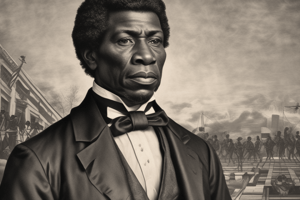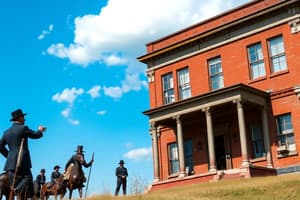Podcast
Questions and Answers
Who are considered members of the sovereignty in the context of the United States?
Who are considered members of the sovereignty in the context of the United States?
The 'sovereign people,' which includes every citizen as a constituent member of this sovereignty.
What position does the text take regarding descendants of Africans who were imported as slaves and their status as citizens?
What position does the text take regarding descendants of Africans who were imported as slaves and their status as citizens?
The text asserts that these descendants were not included under the term 'citizens' in the Constitution.
How does the text differentiate between state citizenship and federal citizenship?
How does the text differentiate between state citizenship and federal citizenship?
The text states that having rights as a citizen of a State does not guarantee one is a citizen of the United States.
What is the scope of Congress's authority regarding naturalization according to the text?
What is the scope of Congress's authority regarding naturalization according to the text?
What does the text imply about the due process of law in relation to property rights, specifically concerning slaves?
What does the text imply about the due process of law in relation to property rights, specifically concerning slaves?
What significant legal status did the Supreme Court ruling in the Dred Scott case deny to people of African descent?
What significant legal status did the Supreme Court ruling in the Dred Scott case deny to people of African descent?
What were the main locations involved in Dred Scott's life that influenced his legal battles?
What were the main locations involved in Dred Scott's life that influenced his legal battles?
In what year did Dred Scott file his first suit for freedom, and against whom did he file it?
In what year did Dred Scott file his first suit for freedom, and against whom did he file it?
What was the outcome of Dred Scott's case in the Supreme Court?
What was the outcome of Dred Scott's case in the Supreme Court?
Who became Dred Scott's enslaver during the legal proceedings, and what role did he play in the Supreme Court case?
Who became Dred Scott's enslaver during the legal proceedings, and what role did he play in the Supreme Court case?
Flashcards
Sovereignty
Sovereignty
The authority of a state to govern itself or another state.
Citizenship in the Constitution
Citizenship in the Constitution
The rights and privileges granted to individuals recognized as citizens in the U.S. Constitution.
Naturalization
Naturalization
The legal process by which a non-citizen becomes a citizen of a country.
Dred Scott case
Dred Scott case
Signup and view all the flashcards
Fifth Amendment
Fifth Amendment
Signup and view all the flashcards
Dred Scott
Dred Scott
Signup and view all the flashcards
Scott v. Sandford
Scott v. Sandford
Signup and view all the flashcards
Decision of 1857
Decision of 1857
Signup and view all the flashcards
Property vs. Citizens
Property vs. Citizens
Signup and view all the flashcards
Chief Justice Taney
Chief Justice Taney
Signup and view all the flashcards
Study Notes
Dred Scott v. Sandford Supreme Court Case
-
Dred Scott's Enslavement and Case Background: Dred Scott, an enslaved man, was taken from Missouri (a slave state) to Illinois and the Wisconsin Territory (free states). He married Harriet Robinson and had two daughters, Eliza and Lizzie. Returning to Missouri, Scott sued for his and his family's freedom in 1846, leading to a lengthy legal battle. John Sandford became his owner during this process.
-
Supreme Court Decision (1857): The Supreme Court ruled 7-2 in favor of Sandford, asserting that Scott was not a citizen and had no right to sue in federal court.
-
Key Ruling Points:
- People of African descent, regardless of their status as enslaved or free, could not be U.S. citizens.
- The court deemed enslaved people as property, equating them to other forms of property.
- Congress lacked the authority to prohibit slavery in the territories.
-
Constitutional Basis of the Ruling:
- The Court interpreted the Constitution as not granting citizenship rights to African Americans.
- The Court's view was that the Constitution afforded rights to citizens but not to African Americans.
-
Arguments in the Opinion: The Supreme Court opinion emphasized that enslaved people held a subordinate status, and the Court stressed that it was not its role to judge the fairness or policy of slavery laws.
-
Territorial and State Citizenship Distinction: The Supreme Court distinguished between state citizenship and U.S. citizenship, asserting that state citizenship didn't automatically grant U.S. citizenship.
- States couldn't confer U.S. citizenship to those whom the Constitution excluded.
-
Property Rights and Congressional Authority:
- The Court declared acts prohibiting slavery in territories as unconstitutional.
- The Court argued that the rights of slave owners were protected under the Constitution.
-
Slavery in Territories Under the Constitution: The court opined that property rights, including those pertaining to slaves, held the same weight as other property rights in the territories.
- The Court decided that an act of Congress prohibiting slavery in U.S. territories was unconstitutional.
Studying That Suits You
Use AI to generate personalized quizzes and flashcards to suit your learning preferences.




